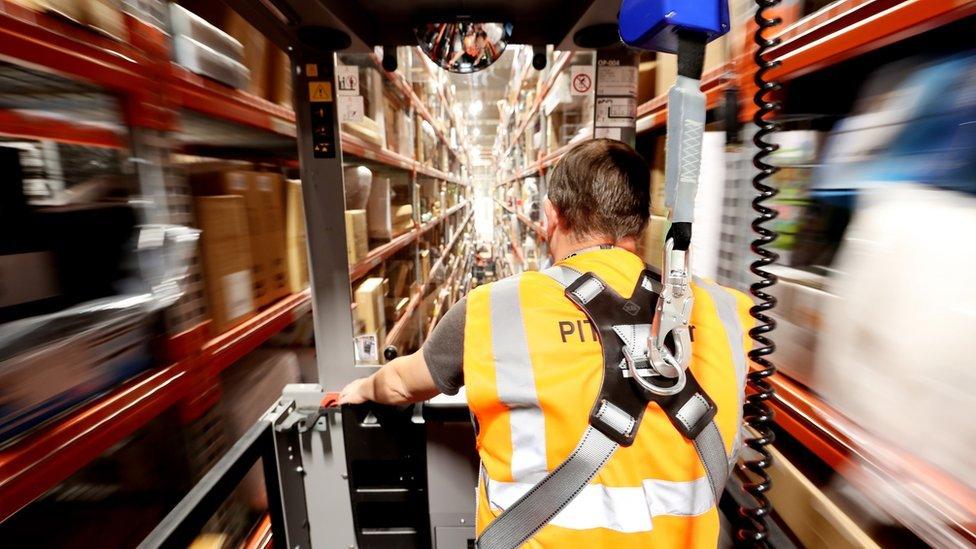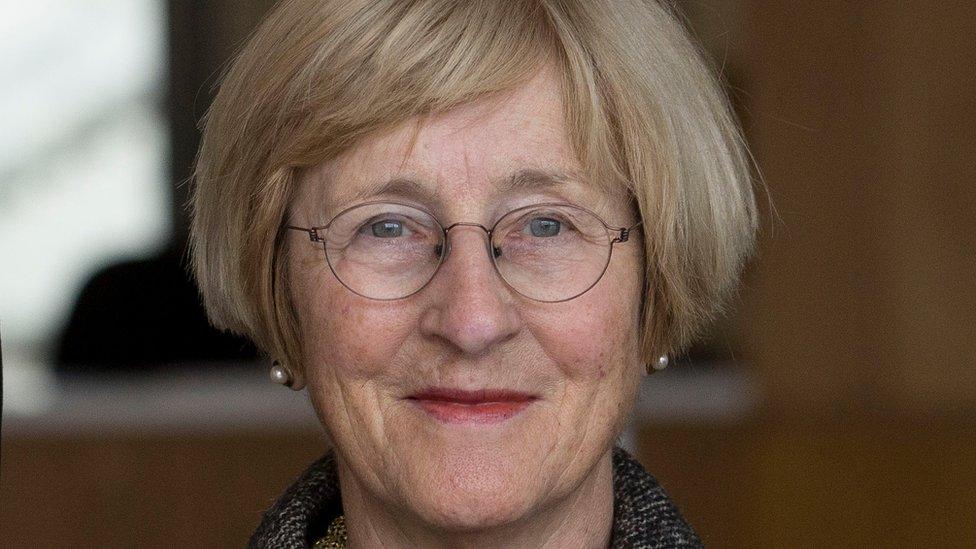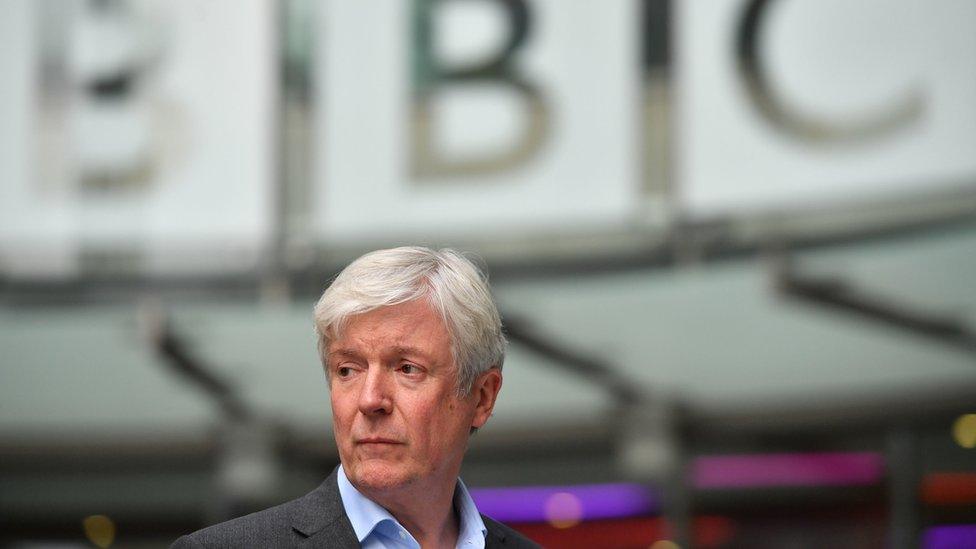Amol: My media predictions for 2019
- Published

The willingness of humanity to forfeit decision-making to algorithms is likely to grow exponentially.
Looking back over my predictions for 2018, I realise they were a mixed bag at best, wet and woolly at worst. Now there's a mixed metaphor to get the year under way.
I was cowardly or wrong with my specific punts, and a bit obvious with my broad themes.
It's true that the tech-lash continued, consolidation was rampant, and we got some evidence of Russian interference in America's election.
But the phenomenon of cameras being taken up as a way of talking didn't grow exponentially, as I said it would; a major BBC News show or service didn't shut, and no foreign investor swooped on Fleet Street.
Oh well. Forecasting is but a species of fraud: common sense tells you that. But being wrong, boring or both never stopped other pundits getting rich. Here's the content of my crystal ball for 2019.
1/ Election interference on an unprecedented scale
In January, the DCMS Select Committee report on fake news and misinformation will be brutal in its assessment of what happened during the Brexit campaign, singling out particular ire for Facebook.
In America, ongoing investigations into Russian interference will yield more specific information about what bot-masters ultimately controlled by the Kremlin may or may not have done.
But all this will be a mere fraction of the digital vote-rigging in the Indian and Indonesian elections of 2019. These are massive democratic events; in fact, the biggest ever. In India, the world's largest democracy, there is deep sectarian tension and signs of a comeback by the Congress Party against the more Hindu nationalist rulers, the BJP.
Moreover, Facebook's WhatsApp platform was recently the source of scurrilous rumours there that led to appalling violence. If the election is tight, it would be naive to think malign or foreign actors will stay away.
In Indonesia, the presidential election will determine who leads the world's most populous Muslim nation. Together with Turkey, Indonesia is central to debates about the reconciliation of modern, global Islam with democracy.
Therefore, a lot of malign and foreign actors will consider it their business to get involved. Bots will be their preferred mechanism.
2/ New entrants in the streaming wars
Streaming has completely changed both TV and radio, and the pace of change will accelerate next year. AT+T's WarnerMedia will launch a major player towards the end of the year. So too will Disney, whose Bob Iger is the most powerful CEO in global media beyond the tech companies.
Already Netflix has said it will boost content spend even further; by the end of next year, investors might ask to see a clearer path to long-term profitability. If that involves raising prices or reducing content spend, other streamers, from YouTube and Hulu to Amazon and Disney, might slash prices to lure new customers in.
Away from news and sport, linear TV will inevitably continue to feel the strain. Overall, the story of ratings for scheduled TV will carry on being one of secular decline, albeit slowed by an ageing population and superstar hits from Bake Off to Bodyguard.
3/ Amazon will re-shape an ad industry in crisis
The last few years have been hellish for many chief marketing officers (CMOs), who struggle to know where they get the best bang for their buck. As management consultancies move more and more into this terrain, agencies face fresh competition. These pressures have contributed to consolidation among the big holding companies, of which there is likely more to come.
Above all, the duopoly of Facebook and Google has also terrified many ad agencies, who are having to fight harder and harder to justify their fee.
In 2019, watch Amazon challenge the duopoly. This year, Amazon's ad sales growth has been nuts. For three quarters in a row it has registered triple digit growth. In the third quarter, it was up 123 per cent, to $2.5bn. Like I said, nuts.

Amazon.com is just one part of the multi-billion pound Amazon story
Within a couple of years, Amazon could earn more from selling ads than it does from its cash cow, Amazon Web Services. Like I said, nuts.
Next year, the digital duopoly will evolve into a digital triopoly.
4/ Facebook pivots, squeezing its smaller assets - but beware advertisers fleeing en masse.
I hereby make three outlandish predictions about Facebook.
First, Mark Zuckerberg will remain Chairman, despite growing pressure to relinquish the role and merely retain his status as CEO, founder, and majority shareholder. This pressure will grow following the publication of Zucked, external, by a former early stage investor. Sheryl Sandberg will still be in post this time next year.
Second, Facebook will move into live sports. I can see it now: late one March afternoon in sunny Menlo Park, Zuckerberg says to new hire Nick Clegg "Hey, Nick, I know you're a fan of tennis. Didn't Cameron beat you at Chequers? I read that somewhere... anyway, Roger Federer and his wife are in town and Priscilla and I having dinner with them. Do you and Miriam fancy joining?"
At which point a light-bulb goes off in the head of the former Deputy Prime Minister, who after agreeing to dinner says, "Hey Mark, don't you think we should bid for Wimbledon when the rights come up? I hear the BBC is feeling very vulnerable on live sports. We could use it to boost our Live offering and make a play for Asia."
To which the Facebook chief responds: "Great idea! Our slogan could be move fast and tie-break things!". "Great!", says Clegg. "Let's sign Rog up tonight!"
Third, Facebook will float the idea of a premium - i.e. paid-for - service. Ad-free of course.

Looking ahead to 2019: Mark Zuckerberg and his wife Priscilla Chan posted on his Facebook feed on New Year's Day
Aside from all that, 2019 may be the year that Facebook tries to squeeze much more revenue out of WhatsApp and Instagram. Conveniently, the founders of both have retired early, having sold their companies to Facebook. Expect to see more ads on Instagram, and businesses invading your WhatsApp feed, a commercial gold-mine Facebook has barely touched.
Unknown unknowns like Cambridge Analytica caused Facebook huge headaches last year. This year there will be more unforeseen problems, along with those that can be planned for.
5/ Ever more politicians - though not journalists - will favour Instagram over Twitter
Seeing what a putrid sewer so much of Twitter has become, and more importantly the remarkable growth in users of Instagram, especially among young people, more and more politicians around the world will favour Instagram over Twitter for breaking their own news or making policy announcements.
Journalists will stick to Twitter though, because they are addicts and the product is still, just, uniquely effective at telling you what's going on. And President Trump will stay on Twitter, of course, because he has mastered it.
6/ The Cairncross Review won't save a single local newspaper

Dame Frances Cairncross is leading the review into how to sustain the production and distribution of high-quality journalism
That's not to say it won't be useful. Dame Frances Cairncross is clever, pragmatic and instinctively on the side of journalists: but her experience attests to the fact that, in some industries, the internet has created problems for which there is no solution.
I can already hear the disappointment among local newspapers, many of whom have got their hopes up that this review will offer a grey bullet if not a silver one.
It won't. It will say: the classified ad market is gone and won't come back; local newspapers will only survive if the communities they serve are passionate about maintaining them; some form of public subsidy may be necessary, and there are a few options for what that might be; the tech giants have done a bit to support subscriptions (especially Google, and increasingly Facebook) but could do more; driving revenue from readers rather than advertisers is the only real hope; UK titles should look to American innovators like The Athletic, external for inspiration; and specialism and philanthropy have a growing role to play.
7/ The BBC's funding crunch will prompt radical solutions, big deals and dread
The BBC wants to reform its funding of free licences for the over-75s. I should stick my neck out and say that the BBC will take the radical option, and scrap the policy altogether; but a decision hasn't yet been made.
The public consultation on what to do about this Coalition-era policy will, the Corporation says, be driven by the principle of fairness. In fact, it is being driven by urgency. For nearly a century the BBC has been the dominant, at times near-monopolistic, player in its chosen domains.
That is gone, and won't come back. In relative terms, particularly in the hyper-inflationary world of global entertainment, the BBC is getting poorer. (Expect Amazon to announce the budget for Lord of the Rings at well over $1bn this year: about the cost of those over-75 licences).
Director-General Tony Hall says that the iPlayer is where BBC viewing will be in future; but for now it is a fraction of total viewing, and retaining the affection of loyal audiences who have paid licence fees for years, and happen to enjoy daytime formats that win few awards and plaudits, is just as important.
The BBC will lobby Ofcom hard to allow more to be uploaded on the iPlayer, and for it to stay there longer. And look out for some big deals coming out of BBC Studios, the production arm, which is now under real pressure to bring in ever more cash.

The BBC's Director General Lord Hall says global media giants have created new definitions of market scale.
By the way, these are structural rather than creative issues. Ratings-wise, the BBC had a lot of mega-hits in 2018. But if it can't sustain ratings across the schedule, and if young people flee to other providers, the question of what the BBC is for becomes more pressing.
The same is true of Channel 4. Almost every week I speak to someone senior in the industry, whether at a broadcaster or independent production company, who bemoans the ratings there.
But ratings are down generally. Channel 4 is putting out plenty of excellent television; but the circumstances that made it a vital alternative to the Establishment in 1982 are long gone. Restricted by Ofcom regulations, unable to own intellectual property as they'd like, and unable to make as much money from catch-up as live broadcasting, the Channel is having to fight ever harder for a hearing, on a pretty fixed budget. That's tough.
8/ Ofnet is mooted
A government paper looking at harms caused by the internet may not just float but actively recommend the establishment of a regulator for the internet - or just social media, whatever that means - in Britain.
This will be a fiendishly difficult job, and it will take someone of enormous stature to lead any such organisation, given its political sensitivity. I'd be surprised if Sharon White, the current boss of Ofcom, could be persuaded to jump ship.
9/ Half the world will be online
Ok, this may have happened already. Almost certainly the exact moment will not be known. But what a remarkable testament to human engineering and ingenuity.
10/ Voice activation grows exponentially*
Smart speakers, of the kind that Amazon, Apple, Samsung and Google are now pushing hard, have big appeal to an ageing population. For the immobile, lazy, or slow, being able to say "Alexa, play me Beethoven's 9th" is highly convenient.
Of course, these devices have an appeal to people of any age, as long as they're not paranoid about massive technology companies listening in to their daily conversations.
Amazon alone is expecting sales growth, external of around 50 per cent this year. There is huge excitement across the global radio sector for what these speakers might do to our listening habits. Any new audio distribution channel should be welcomed; and these speakers could drag 'radio', loosely defined, out of the kitchen and back into the living room.
It is too early to tell whether this is happening. But, together with the continued growth of podcast listening (still a tiny fraction of total radio consumption), the ageing population in the West, and the falling prices of these devices, it's easy to see their growth continuing.
*But Virtual Reality and Augmented Reality do not. How many people do you know who own a fancy Oculus headset? Despite the attention being given to it by the DCMS Select Committee, this technology remains niche.
11/ Chinese tech giants make a play beyond China's borders
Baidu, Alibaba and Tencent emerged in a mobile-first environment, and whereas America's tech giants have an antagonistic relationship with their country's government, China's are part of the same project of national greatness as their Communist Party.
While China's Belt and Road Initiative has received huge attention as an infrastructure-led push to nurture ties around the world through economic links (see Peter Frankopan's superb 'The New Silk Roads', external for an explanation), the logical next phase is for consumers beyond China to become part of the country's digital ecosystem.
Google has a project to get the next billion consumers online. China's three biggest tech companies will want to beat them to it, and so reap financial and cultural benefits in the medium-term.
12/ Slaves to the algorithm
The willingness of humanity to forfeit decision-making to algorithms will grow exponentially.
13/ A foreign investor will swoop on Fleet Street
Now where have I heard this before?
Best wishes for 2019 to all readers of this blog.
If you're interested in issues such as these, you can follow me on Twitter, external or Facebook, external; and subscribe to The Media Show podcast from Radio 4.
